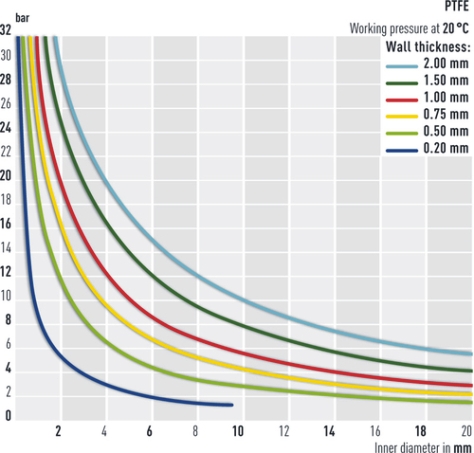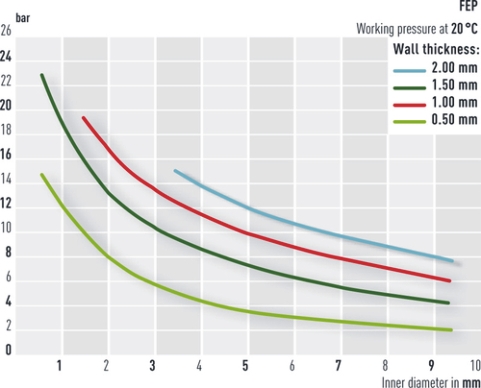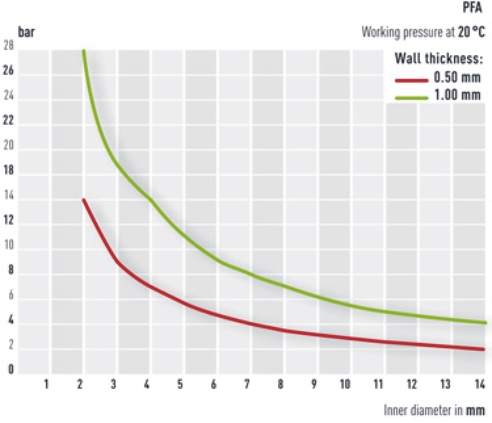Source: BOLA (www.bola.de)
Pressure Resistance – PTFE Tubing
The graph show the maximal recommended working pressure (approx. 0.25 x short time burst pressure) for PTFE tubing depending on the inner diameter and the wallthickness at 20 °C. For working temperatures above +20 °C the working pressures stated in this graph have to be multiplied by the corresponding reduction factor. For temperatures below +20 °C no reduction factors have to be considered.
Example: For PTFE tubing with inner diameter of 6 mm and a wall thickness of 1 mm the working pressure at +20 °C is about 8.8 bar. At a temperature of +50 °C, this value has to be reduced to 7.6 bar (pressure 8.8 bar x reduction factor 0.87 = 7.65 bar).
| Temperature (°C) | 50 | 75 | 100 | 150 | 200 | 250 |
| Reduction factor | 0.87 | 077 | 0.68 | 0.53 | 0.39 | 0.28 |

Pressure Resistance – FEP Tubing
The graph below show the maximal recommended working pressure (approx. 0.25 x short time burst pressure) for FEP tubing depending on the inner diameter and the wallthickness at 20 °C. For working temperatures from -50 °C to +150 °C the working pressures stated in this graph have to be multiplied by the corresponding reduction factor.
Example: For FEP tubing with inner diameter of 6 mm and a wall thickness of 1 mm the working pressure at +20 °C is about 7.8 bar. At a temperature of +50 °C, this value has to be reduced to 6.1 bar (pressure 7.8 bar x reduction factor 0.78 = 6.1 bar).
| Temperature (°C) | -50 | 0 | 20 | 50 | 100 | 150 |
| Reduction factor | 1.13 | 1.04 | 1 | 0.78 | 0.45 | 0.21 |

Pressure Resistance – PFA Tubing
The graph below show the maximal recommended working pressure (approx. 0.25 x short time burst pressure) for PFA tubing depending on the inner diameter and the wallthickness at 20 °C. For working temperatures above +20 °C the working pressures stated in this graph have to be multiplied by the corresponding reduction factor. For temperatures below +20 °C no reduction factors have to be considered.
Example: For PFA tubing with inner diameter of 4 mm and a wall thickness of 1 mm the working pressure at +20 °C is about 14 bar. At a temperature of +50 °C, this value has to be reduced to 12 bar (pressure 14 bar x reduction factor 0.86 = 12 bar).
| Temperature (°C) | 50 | 100 | 200 | 250 |
| Reduction factor | 0.86 | 0.5 | 0.26 | 0.21 |

Bending radius of PTFE, PFA and FEP tubing
To avoid buckling of the tubing with all its negative aspects, the following equation will be helpful to determine the smallest possible bending radius.
smallest bending radius = (Aussendurchmesser x Aussendurchmesser) / Wandstärke
Beispiel: PTFE-Schlauch mit einem Außendurchmesser von 14 mm und einer Wand von 2 mm ergibt den minimalen Radius von 98 mm.
Permeability of PTFE and PFA
Because of its special processing and the resulting structural conditions, PTFE has a higher permeability than other thermoplastics. PFA has at the same wall thickness a lower permeability than PTFE due to its tight molecular structure.
You can visit the tube page here.